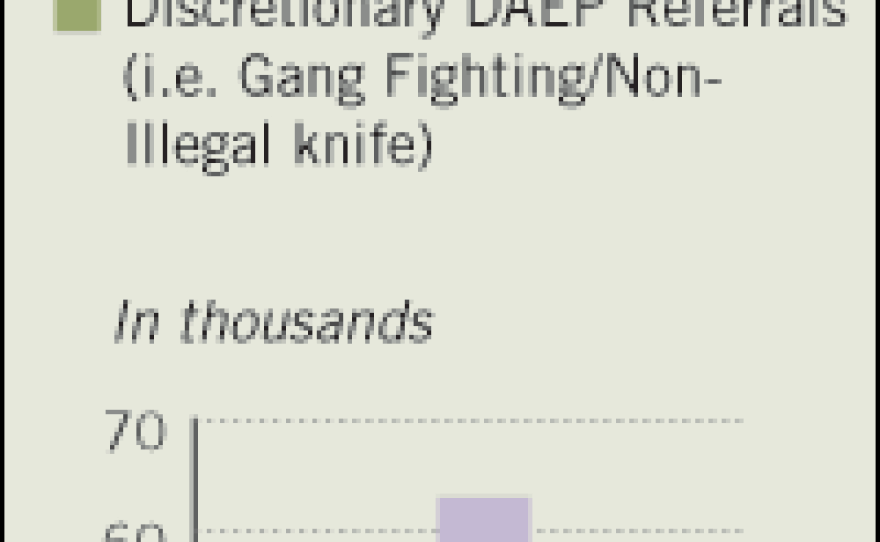

School is out for the summer, and Sharonda Jackson is at home with her four children on the north side of Houston. Malique, the youngest, just turned 11. His mother makes it clear that he's a handful.
"Every other week, he was getting suspended," Jackson says. "He was in out-of-school suspension, in-school suspension, in the principal's office all day."
Malique has been diagnosed with attention deficit disorder and more recently, with bipolar disorder. Jackson worked out a behavior-management plan with his school in an effort to control Malique's outbursts.
Last year, that plan fell apart: Malique lost his temper and kicked another child in the chin. He was sent to an alternative school — and charged with a misdemeanor. Jackson says she had no idea that could happen.
"I know there are consequences for fighting in school," she says. "But charged with a misdemeanor and felony cases? No."
Removed for Relatively Minor Offenses
Malique is one of more than 100,000 Texas schoolchildren removed from their regular schools each year and sent to "discipline alternative-education placement," or DAEP.
The practice isn't unusual: In school systems across the country, students who act out are sent to special "alternative" schools. Administrators say it's the best way to keep schools safe, and in fact, state laws in Texas and elsewhere mandate that students be suspended for weapons or drug offense.
But most of the students removed from Texas classrooms have committed relatively minor, nonviolent offenses, says Rebecca Lightsey of Texas Appleseed, an Austin-based advocacy group. For many, this marks the beginning of the end of school.
Lightsey's group conducted a study on the effects of Texas' "zero tolerance" approach to discipline in schools. It found that students sent to alternative schools are five times more likely to drop out — and they're more likely to end up in prison.
As for Malique, he has moved to a new school that seems better able to deal with him. His old school would not return calls about his behavior. School districts generally refuse to comment on individual cases, for fear of violating student privacy.
Minorities More Likely to Be Removed
Hector Rodriguez, a former school principal, now runs the alternative-education programs in Austin, the Texas capital. Rodriguez says that some students have to be removed so that others can learn.
But he also acknowledges that the students sent to his alternative facility are disproportionately black or Hispanic, or are special-education students. The same is true nationally. The problem overall, he says, is one of a culture clash with an administration guided by middle-class values.
"Unfortunately," Rodriguez says, "for many of the minority students, they don't come to school with the values that would allow them to be successful in this type of environment."
Suspending Kids as Young as 6
The Texas Appleseed study showed some districts are far more likely than others to send students to alternative schools. While the state average was 2 percent, Lightsey says some districts sent the equivalent of up to 20 percent of their students to DAEP facilities.
The Pasadena Independent School System, outside Houston, has one of the highest student-suspension rates in the state. Over the past five years, Pasadena administrators have sent more than 500 kids under age 6 to alternative-education centers.
Pasadena officials defend their approach, saying that many younger students are sent to a "counseling center," not a disciplinary school. Spokeswoman Candice Ahlfinger says the goal is not strictly punishment: Some kids thrive in an alternative setting, she says.
Court Rooms Filled with Students
In Harris County, Texas, on the edge of Houston, court is in session. On a recent day, a couple hundred people wait in the administrative building to pay fines for traffic violations or other minor offenses. Some of them aren't even old enough to drive. Every week, dozens of school children show up to resolve class-C misdemeanor citations: They get tickets for acting out in class.
Antoinette Jones is in the building because her son and daughter received a string of citations after the family fled Hurricane Katrina, and Houston kids started teasing them.
According to Jones, school rules dictate that whenever two students get in a fight, both of them will be ticketed. Somehow, the other students always seem to get away, while her children get caught, she says. Things have settled down in recent months, but she keeps having to return to court because of tickets that are more than a year old.
Nearby in the crowded hallway, public-interest attorney Dustin Rynders works out a plea agreement for a 15-year-old client. It's a scene repeated over and over in courthouses around the state: Students who violate their school's code of conduct must show up in court. Rynders says hauling students into court leaves a permanent mark on their futures.
"One unfortunate effect is that it does establish a criminal record that they would have to reveal later in life when applying for schools and applying for jobs," Rynders says. "The other thing is that they begin to learn and take in that they're dealing with school officials that aren't willing to work with them."
The Texas legislature has just passed a law that is supposed to raise the threshold for such tickets. It's not clear whether that will change the landscape here. Across the country, the question is whether there can be equal justice for students when there are two separate school systems: One for those who fit in, and another for those who don't.
Copyright 2022 NPR. To see more, visit https://www.npr.org. 9(MDAzMjM2NDYzMDEyMzc1Njk5NjAxNzY3OQ001))






